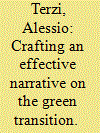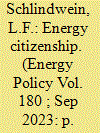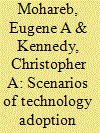|
|
|
Sort Order |
|
|
|
Items / Page
|
|
|
|
|
|
|
| Srl | Item |
| 1 |
ID:
177131


|
|
|
|
|
| Summary/Abstract |
The ambitious carbon-reduction targets set out by the Paris Agreement, or by recent Green Deals such as the one launched by European Commission President Ursula von der Leyen, will require a high degree of engagement with the public. This is true not only as important changes in lifestyle are going to be needed from citizens, especially in developed economies, but also because top-down measures will need public approval to be put in place. This paper reviews literature from behavioural and environmental economics, cognitive sciences, (social) psychology, health policy, and marketing to condense key insights on how to make communication on the green transition more effective in terms of citizens’ engagement. In doing so, it distils six policy recommendations that can serve as building blocks for an impactful narrative accompanying decarbonisation strategies, in Europe and beyond. If used skilfully, an effective communication and consequent behavioural change holds the promise of complementing top-down financial and regulatory tools, accelerating the green transition.
|
|
|
|
|
|
|
|
|
|
|
|
|
|
|
|
| 2 |
ID:
191384


|
|
|
|
|
| Summary/Abstract |
According to the European Green Deal, achieving energy transition, which aims to establish a shift towards a more sustainable and low-carbon energy system, requires the active participation of citizens. Consequently, the concept of energy citizenship has emerged as a means of understanding the role of citizens in this process. This study conducts an integrative literature review with the objective of providing a comprehensive definition of energy citizenship and distinguishing between different types of energy citizens based on their engagement within the energy system. Six different types of energy citizens (i.e., consumer; prosumer and prosumager; participant in protests and movements; policymaker; business entity; and energy community), acting as either individuals or as collective entities or both, have been defined. This differentiation highlights the heterogeneity of human behaviours within energy transition. We argue that policymaking aimed at fostering energy transition should consider the behavioural dimensions of all types of energy citizens. In order to effectively support a fair, inclusive, and just energy transition, policy measures and intervention instruments need to account for various barriers, drivers as well as the socio-economic context of the diverse stakeholders participating in innovation ecosystems.
|
|
|
|
|
|
|
|
|
|
|
|
|
|
|
|
| 3 |
ID:
101450


|
|
|
|
|
| Publication |
2010.
|
| Summary/Abstract |
Previous attempts to change energy-related behaviour were targeted at individuals as consumers of energy. Recent literature has suggested that more focus should be placed on the community level and that energy users should be engaged in the role of citizens, and not only that of consumers. This article analyses different types of emerging low-carbon communities as a context for individual behavioural change. The focus is on how these communities offer solutions to problems in previous attempts to change individual behaviour. These problems include social dilemmas, social conventions, socio-technical infrastructures and the helplessness of individuals. Different community types are examined, including geographical communities as well as sector-based, interest-based and smart mob communities. Through four case studies representing each of these community types, we examine how different communities reframe problems on the individual level to reduce carbon emissions. On the basis of an analysis of the strengths and weaknesses of various community solutions, implications are drawn for further research and for the design and support of low-carbon communities
|
|
|
|
|
|
|
|
|
|
|
|
|
|
|
|
| 4 |
ID:
150802


|
|
|
|
|
| Summary/Abstract |
The transition to smart grids is an on-going process that may both shape and be shaped by end-users' energy behavioural adaptations. This study explores current and potential energy behavioural adaptations in Portugal during the smart grid transition process. A web-based survey was made to a representative sample of a specific segment of Portuguese residential end-users. The survey evaluated current energy behaviours and hypothetical future behaviours in a dynamic pricing scenario. Results show this population segment has a positive predisposition towards smart technologies and demand shifting, but it is less likely to accept load control and switch to the liberalised energy market. Factors influencing the behavioural potential are mostly related with market regulation, households' practices and usage behaviours, interference with the private domain, information and technical aspects, and social values. To facilitate behavioural adaptations several strategies are recommended, such as improving the energy market regulation, assessing households' behaviours, prioritising actions already embedded in households daily routines, not interfering with their activities and ensure an override option, and improving energy services, trust and information provided to end-users. The conclusions of the present study are of utmost importance for the design of more effective demand response programmes and energy policies.
|
|
|
|
|
|
|
|
|
|
|
|
|
|
|
|
| 5 |
ID:
128053


|
|
|
|
|
| Publication |
2014.
|
| Summary/Abstract |
Technological change has often been presented as a readily accepted means by which long-term greenhouse gas (GHG) emission reductions can be achieved. Cities are the future centers of economic growth, with the global population becoming predominantly urban; hence, increases or reductions of GHG emissions are tied to their energy strategies. This research examines the likelihood of a developed world city (the Greater Toronto Area) achieving an 80% reduction in GHG emissions through policy-enabled technological change.
Emissions are examined from 3 major sources: light duty passenger vehicles, residential buildings and commercial/institutional buildings. Logistic diffusion curves are applied for the adoption of alternative vehicle technologies, building retrofits and high performance new building construction. This research devises high, low and business-as-usual estimates of future technological adoption and finds that even aggressive scenarios are not sufficient to achieve an 80% reduction in GHG emissions by 2050. This further highlights the challenges faced in maintaining a relatively stable climate. Urban policy makers must consider that the longer the lag before this transition occurs, the greater the share of GHG emissions mitigation that must addressed through behavioural change in order to meet the 2050 target, which likely poses greater political challenges.
|
|
|
|
|
|
|
|
|
|
|
|
|
|
|
|
|
|
|
|
|